#Second Battle of Philippi
Photo
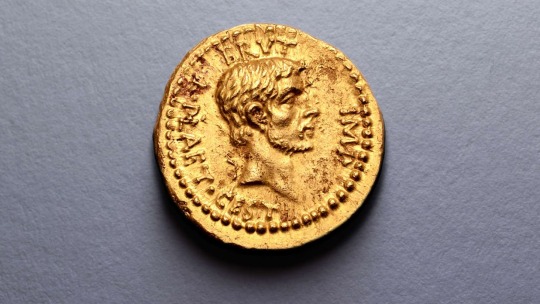
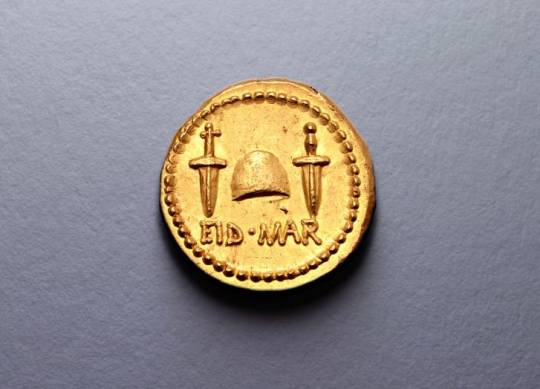
Very Rare Roman Gold Coin is Returned to Greece
A Very Rare Gold Coin, Minted by Brutus to Mark Caesar’s Death, Is Returned to Greece
The gold coin, which dates from 42 B.C. and is valued at $4.2 million, is thought to have been looted from a field near where an army loyal to Brutus camped during the struggle for control of Rome.
A rare and ancient gold coin that morbidly celebrates the stabbing death of Julius Caesar was returned this week to Greek officials by investigators in New York who had determined it was looted and fraudulently put up for sale at auction in 2020.
The coin, known as the “Eid Mar” and valued at $4.2 million, features the face of Marcus Junius Brutus, the onetime friend and ally of Caesar who, along with other Roman senators, murdered him on the Ides of March in 44 B.C. According to historians and experts, Brutus had the coins minted in gold and silver to applaud Caesar’s downfall and to pay his soldiers during the civil war that followed the killing.
The return Tuesday came at a ceremony attended by officials of the Manhattan district attorney’s Antiquities Trafficking Unit and U.S. Homeland Security Investigations, who cooperated on the case.
The coin, one of 29 artifacts returned to Greek officials, was given up earlier this year by an unidentified American billionaire who, investigators said, had bought it in good faith in 2020. The British dealer who helped to arrange the sale was arrested in January, and the coin itself was recovered in February, officials said.
Experts said the coin, minted two years after Caesar’s death, is about the size of a nickel and weighs about 8 grams, and is one of only three known to be in circulation. A silver version of the coin was also minted and about 100 are known to exist. Those can sell for $200,000 to $400,000.
“The Eid Mar is an undisputed masterpiece of ancient coinage,” Mark Salzberg, the chairman of Numismatic Guaranty Corp., which verified the coin but does not research provenances, said in a statement in 2020.
Experts said they believe the coin was likely discovered more than a decade ago in an area of current-day Greece where Brutus and his civil war ally, Gaius Cassius Longinus, were encamped with their army.
The front, or obverse, of the coin features an engraved side view of Brutus and the Latin letters “BRVT IMP” and “L PLAET CEST.” Experts say the former stands for “Brutus, Imperator,” with imperator referring not to emperor but to commander. The latter stands for Lucius Plaetorius Cestianus, who was a treasurer of sorts for Brutus and oversaw the minting and assaying of his coins.
The reverse features two daggers on either side of a cap known as a pileus. The daggers stand for Brutus and Cassius and reflect the manner of Caesar’s death, experts say, while the cap is a symbol of liberty that was worn by freed slaves. Overall, the image is meant to celebrate the murder as an act by which Rome was liberated from Caesar’s tyranny. Beneath the symbols is the Latin inscription “EID MAR,” designating the Ides of March — March 15, 44 B.C. — the fateful day on which the conspirators left Caesar dead on the floor of the Roman Senate.
Historians see irony in the fact that Brutus, who had admonished Caesar before the murder for the self-aggrandizing act of putting his face on Roman coinage, wound up doing the same with his own coins.
Ultimately, the forces who favored the dead Caesar, led by Mark Antony and others, defeated Brutus and his men in October of 42 B.C. at the Second Battle of Philippi, and Brutus and Cassius committed suicide.
According to investigators, the coin is first thought to have come to market between 2013 and 2014. Richard Beale, 38, director of the London-based auction house Roma Numismatics, put it up for sale on his company’s website and over several years shopped it at coin shows in the United States and Europe before it was sold in October 2020. The $4.2 million was the most ever paid for an ancient coin, according to the Numismatic Guaranty Corp.
Mr. Beale is charged with grand larceny in the first degree and several other felonies and was released on his own recognizance. His lawyer, Henry E. Mazurek, declined to comment on the case.
Among the other Greek antiquities repatriated on Tuesday were figurines of people and animals; marble, silver, bronze and clay vessels; and gold and bronze jewelry. Their total value was put at $20 million.
In remarks at the ceremony, Konstantinos Konstantinou, Greece’s consul general in New York, said his country has been hit hard by the illicit trading of antiquities and is seeking their return “in every possible way.”
He praised investigators for “striking down the illegal international criminal networks whose activity distorts the identity of peoples, as it cuts off archaeological finds from their context and transforms them from evidence of people’s history into mere works of art.”
By Tom Mashberg.
#Very Rare Roman Gold Coin is Returned to Greece#Julius Caesar#Marcus Junius Brutus#Eid Mar#gold#gold coin#collectable coin#ancient artifacts#history#history news#ancient history#ancient culture#ancient civilizations#roman history#roman empire#Mark Antony#Second Battle of Philippi#long reads
205 notes
·
View notes
Text
SECOND BATTLE OF PHILIPPI, 23 RD OCT, 42 BC
Following the first battle both sides returned to their original camps to re-group. Brutus, taking over Cassius' camp, sought to stick to his original plan of holding station until the enemy was forced to withdraw through lack of provisions. Brutus did harass the enemy via night attacks on their position and even diverting a river to wash away part of their camp. Lacking supplies and having lost their back-up in the Adriatic, Antony and Octavian had to make their move before winter really set in and forced them to leave the field. Initially, Brutus stoically resisted the repeated taunting by the enemy to come out and face them but eventually, at least according to the ancient Roman historians, ill-discipline got the upper hand and Brutus' army took their own initiative and descended to the plain.
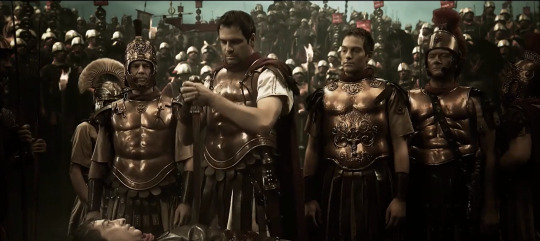
Antony had, meanwhile, also made some daring and decisive moves. First, he took full advantage of a small mound south of Brutus' camp which the Republican leader had left unguarded (and this despite the fact that Cassius had previously stationed a garrison on it). Building a palisade of whicker, four legions were now dangerously close to Brutus' position. At the same time Antony moved ten legions into the central marsh area and two more a little further east. Brutus responded by building a fortified camp facing each of these two blocks of enemy troops but if the battle lines were extended any further then Brutus would be isolated from his supplies and backed up against the mountains -an impossible position to defend. The Republican army, then, had little choice but to engage the enemy with a full-scale assault. The time for dilly-dallying was over.
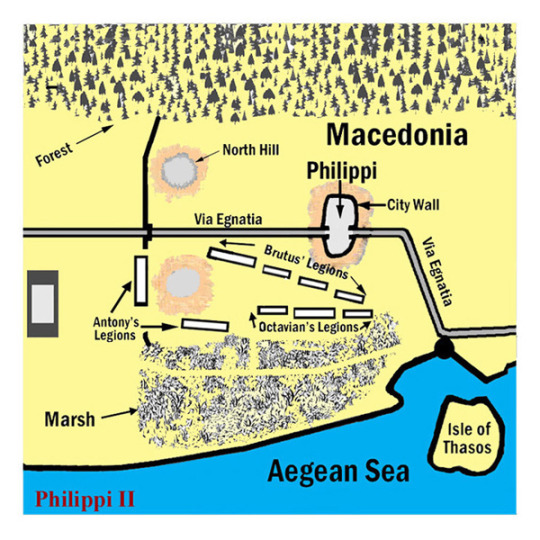
The use of artillery weapons in the confines of such a tightly-packed battlefield was considered impractical and the opposing armies immediately clashed in fearsome hand-to-hand fighting. Initially, the Republicans did well against the enemy's left wing but Brutus, with fewer troops at his disposal, had stretched his lines thin to ward of an out-flanking manoeuvre. The consequence was Antony relentlessly pushed forward and smashed the enemy centre and, moving left, attacked the rear of Brutus' lines. The order of the Republican troops now completely broke down and chaos ensued. Meanwhile, Octavian had attacked the Republican camp while Antony used his cavalry to chase down Brutus and prevent his escape. The Republican leader had found refuge in the nearby mountains but when his four remaining legions moved to plea for clemency from Antony, Brutus took his own life. In total 14,000 soldiers surrendered and while some others managed to flee by ship to Thasos, the Republican cause was at an end and Julius Caesar's murder had been avenged. In the words of Ovid, "all the daring criminals who in defiance of the gods, defiled the high priest's head [Caesar], have fallen in merited death. Philippi is witness, and those whose scattered bones whiten its earth".
Whilst Antony was hailed as imperator by the victors and losers alike, Octavian, who had dealt more harshly with the defeated, was not so highly esteemed. As Plutarch stated in no uncertain terms, "[Octavian] did nothing worth relating, and all the success and victory were Antony's". The legions were again re-distributed with Antony taking eight to campaign against Parthia whilst Octavian, with three, returned to Italy. The battle, with its 40,000 fatalities and subsequent retaliations against Republican sympathizers, robbed Rome of some of its finest citizens and soldiers, and still the question of just who would rule Rome was not settled.
Sources: Si Sheppard, Philippi 42 BC.
Arthur Weigall, The Life & Times of Marc Antony
#mark antony#marc antony#marcus antonius#battle of philippi#octavian#caesar augustus#second triumvirate#marcus brutus#marcus junius brutus#julius caesar#gaius julius caesar#ancient rome#roman history#roman republic#roman empire#rome#history#otd#this day in history#pawel delag
18 notes
·
View notes
Text
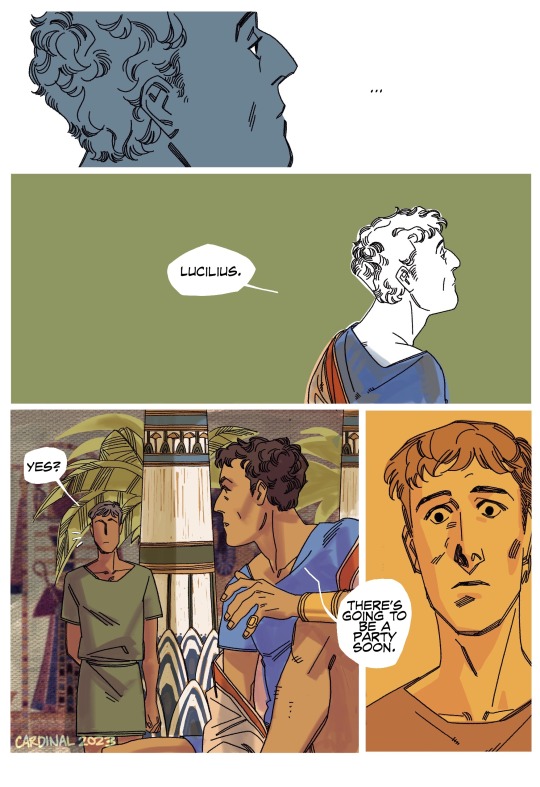
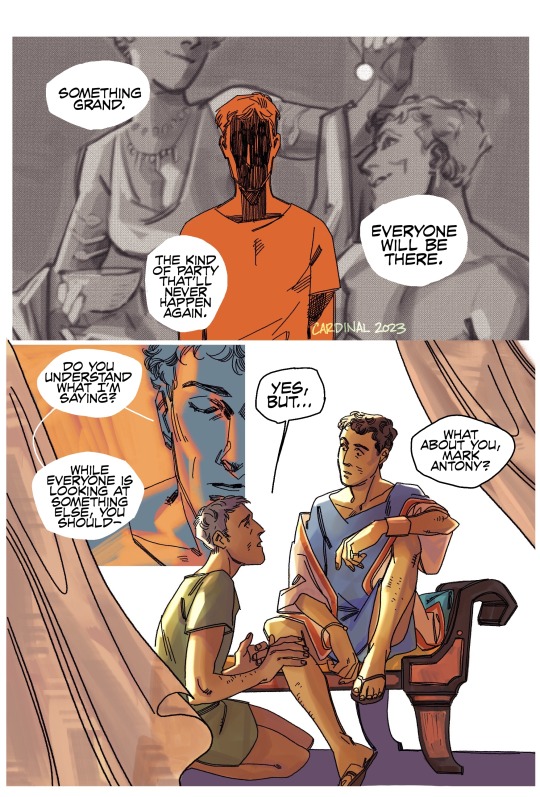
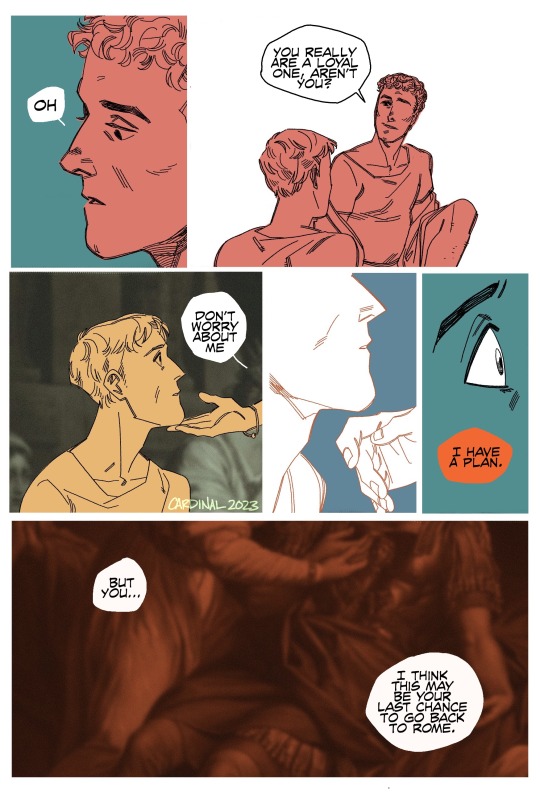
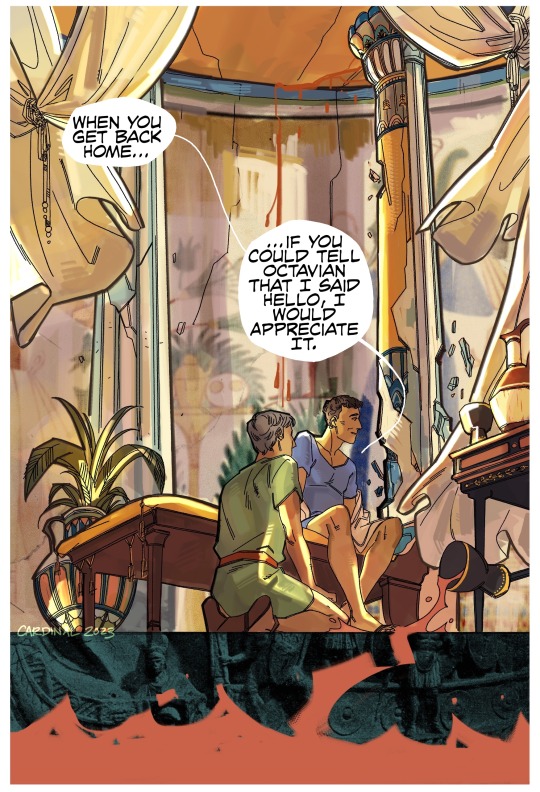
ALRIGHT okay I will attempt to explain this to the best of my ability, which is currently being held together by tape and coffee
so I have a long running post philippi story focusing on the octavian-antony divorce arc conflict and it's heavily dramatized and full of dead people. it's one part historical, one part my own invention, and one part fucking around with ideas (or the lack there of) in movies about antony and cleopatra. many of which are bad! however. there is a bad one that's actually good. like, I wouldn't recommend it except that I talk about it constantly.
it's the 1953 movie, Serpent of the Nile and I have not known peace since watching it. it's one of the more interesting takes on antony and cleopatra (TO ME), and more importantly: I'm obsessed with the plot point where antony helps lucilius escape egypt to warn octavian.
this scene is partially inspired by that! this scene is partially inspired by several things, but that's the one to mention bc I haven't published any of this story except for the periodic scene I've drawn for fun so listing the rest of it will not add to this experience and also I’m very sleepy right now
the egyptian wall backgrounds in the first page and the last page are of a tomb wall painting, the third page uses an illustration of the death of antony for shakespeare's antony and cleopatra, and on the second page is actually my own painting of antony and cleopatra after giambattista pittoni's painting of antony, cleopatra, and the famous pearl incident
additionally, that last page. the floor. that's a relief commemorating the battle of actium. I'd been reading about depictions of actium and it is. intriguing, especially since my first thought wrt to all of that is usually abt the bodies in the water and how they'll never be buried or antony's parthian fuck up setting the stage for all of this.
also this specifically. fascinating.
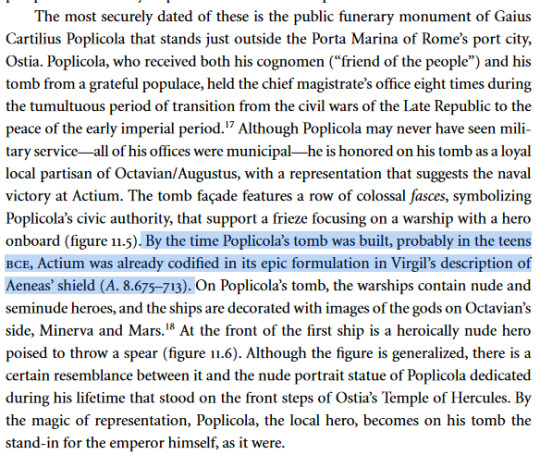
Representations and Re-presentations of the Battle of Actium, Barbara Kellum
#mark antony#lucilius#roman empire tag#drawing tag#komiks tag#long post#antony and octavian are divorced but also in a 'the monster you know' kind of way#octavian's reaction to antony's hello is to turn to octavia and say 'how sweet. I almost miss him. what do you think?'#sometimes a marriage is to two people but also that's on antony for not realizing the extent of which marrying octavia was also marrying#octavian. you know. like bro. that scene in the french musical where octavia is like no :( i love him :( and octavian is like#he FUCKED ME OVER BY FUCKING OVER YOU. that's what it is#god have i ever talked to you guys about french musical octavian. obsessed with him. what on earth is going on with that guy#anyway! farewell! I have been watching the live action one piece and I NEED to draw mihawk and shanks RIGHT NOW
375 notes
·
View notes
Note
Do we know how or when Agrippa and Octavian met? Any rough ideas of their early friendship/shared experiences?
(Sorry if you have answered this before lol.)
According to Nicolaus of Damascus, they were "extremely close" since childhood, and met at school. They had several things in common, which likely brought them together:
They were probably born in the same year.
Both were the youngest child in the family, and had an older brother or stepbrother who was expected to be the heir instead.
Both were sort of outsiders to the Roman political establishment: Octavian's father was a "new man" from outside Rome, while Agrippa had no senatorial ancestors at all.
Both were disabled: Octavian was chronically ill, and Agrippa had some sort of weakness in his legs.
Pliny the Elder says that Agrippa had a "miserable childhood," but doesn't elaborate why. Octavian lost his father at the age of 4, was then separated from his mother and sent to live with his grandmother instead, and his inheritance was stolen/squandered by the man who was supposed to be his guardian.
They must have been friends by the age of 16-17, when Octavian interceded with Julius Caesar to save the life of Agrippa's brother, a Pompeian officer. Despite their families apparently picking opposite political sides, the two remained close.
Octavian would then sail to Spain to join Caesar's final campaign at Munda, though he arrived after the fighting ended. It's likely, but not certain, that Agrippa either sailed with him, or had joined Caesar's forces and met Octavian in Caesar's camp. Agrippa was probably also one of the friends whom Octavian snuck onto Caesar's return ship to Italy, along with their mutual friend Salvidienus. Caesar would then send Octavian, Agrippa and Salvidienus to train in Greece as officers, and the three of them were together when Octavian got news of Caesar's death.
Agrippa and Salvidienus were at Octavian's side throughout the War of Mutina and the formation of the second triumvirate. They met Maecenas around this time. Agrippa and Maecenas accompanied Octavian to the Battle of Philippi.
Interestingly, Salvidienus appears to have initially been Octavian's top choice as general: Octavian gave him six legions to govern Spain, and he and Octavian commanded during the Perusine War, with Agrippa as their subordinate. But soon after this war, Antony revealed Salvidienus as a traitor, and Octavian had his former friend executed (or forced to suicide). Agrippa only received his first independent command afterward, when Octavian sent him to quell an uprising in Gaul.
Agrippa returned having pacified Gaul and Germany, and proceeded to be ludicrously competent at everything for the rest of his life.
Also, Octavian nearly died like...five times during this? Not counting the actual battles he fought. He got seriously ill often and had terrible luck on boats.
#just roman asks#marcus agrippa#octavian#jlrrt essays#quintus salvius salvidienus#gaius cilnius maecenas
61 notes
·
View notes
Text
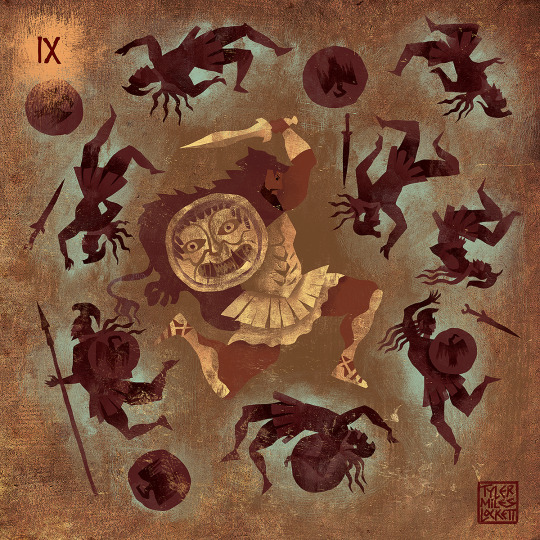
Day 9! 12 days of labors continues! 🤟🏛
Heracles labor 9: "Retrieve the Belt of Hippolyta"
Diodorus gives us a brutal, bloodthirsty version of Heracles as he arrives in the Amazon kingdom of Themiscyra to attain the Queen's belt:
"The first, for instance, to join battle with him was Aella,17 who had been given this name because of her swiftness, but she found her opponent more agile than herself. The second, Philippis, encountering a mortal blow at the very first conflict, was slain. Then he joined battle with Prothoê, who, they said, had been victorious seven times over the opponents whom she had challenged to battle. When she fell, the fourth whom he overcame was known as Eriboea. She had boasted that because of the manly bravery which she displayed in contests of war she had no need of anyone to help her, but she found her claim was false when she encountered her better. 3 The next, Celaeno, Eurybia, and Phoebê, who were companions of Artemis in the hunt and whose spears found their mark invariably, did not even graze the single target, but in that fight they were one and all cut down as they stood shoulder to shoulder with each other. After them Deïaneira, Asteria and Marpê, and Tecmessa and Alcippê were overcome. The last-named had taken a vow to remain a maiden, and the vow she kept, but her life she could not preserve. The commander of the Amazons, Melanippê, who was also greatly admired for her manly courage, now lost her supremacy. 4 And Heracles, after thus killing the most renowned of the Amazons, and forcing the remaining multitude to turn in flight, cut down the greater number of them, so that the race of them was utterly exterminated."
I find this passage fascinating as I don't recognize most if any of the Amazon warriors names. Curious!
***if you share this image, ill go retrieve any belts of yours that were confiscated by bloodthristy savages! xoxo
#pagan#hellenism#greek mythology#tagamemnon#mythology tag#percyjackson#dark academia#greek#greekmyths#classical literature#percy jackon and the olympians#pjo#homer#iliad#classics#mythologyart#art#artists on tumblr#odyssey#literature#ancientworld#ancienthistory#ancient civilizations#ancientgreece#olympians#greekgods#hercules#heracles
175 notes
·
View notes
Text
An essay on why Octavius from NATM is NOT Augustus
It is evident that I hate Augustus. However, hating Augustus does not mean I should support misinformation about Augustus. There are many characteristics that Octavius from NATM has that do not match up with Augustus, the first Roman emperor. Here's why I believe they are completely different people:
1-Appearance
First of all, let's compare their physical appearances. Augustus has been described by Suetonius as pale, dirty bllonde and blue/grey eyed. He was quite skinny and short, most likely due to his asthma preventing him from going out in his childhood and teenage years. While Octavius from NATM has dark hair, dark eyes and is well built. They don't look alike at all. I see no reason as to why the creators of NATM changed his appearance other than because 1. They are different people. or 2. NATM Octavius is a made-up ancient Roman. Of course, there may be other reasons such as Octavius' appearance not being important enough for them to do research on it but I insist that if he really were Augustus, he would not be a general at all.
2-Personality
Second of all, they have different personalities. NATM Octavius is stubborn, brave, a leader. Just your average roman general. Augustus, on the other hand, is not a man to be put on the battlefield. Augustus is said to have been completely disinterested by all things military and often fled the battlefield due to an affliction (sometimes stomach aches, sometimes asthma attacks). An example of this could be the battle of Philippi, when he fled into the marsh because he was feeling ill. He left his battles for his best friend Marcus Agrippa, who handled them with his outstanding military mind. NATM Octavius seems to have no problem with leading an army and fighting during the first movie. Another distinction between their personalities is their composure. Augustus is said to be strangely calm, no matter how bad the situation is while Octavius seems to get pretty hostile sometimes, like he did with Jedediah in the first movie.
3-Name
Third of all, their names don't exactly match. This is a very important thing, because there are many romans named "Octavius" and NATM Octavius could have been any other Octavius. Augustus' birth name was Gaius Octavius Thurinus, but he eventually changed his name to Gaius Julius Caesar Octavianus, after finding out that Julius Caesar had adopted him and named him as hjs heir. Since then, this Roman politician has been referred to as "Julius Caesar". You may think that they called him Octavius to differentiate him with Julius Caesar but that is also wrong, because if they did change his name, they would change it to "Octavian", the name that historians used to call him before he was Augustus. They could've also used Augustus. There is nothing that really indicates that NATM Octavius is Octavian before Actium.
4-Agrippa
Because I love Agrippa, I will give him his own paragraph. NATM Octavius can do what Octavian/Augustus could not do : excel in the military domain. However, that is what Agrippa is for. Let's say Octavian learned strategies and logistics and becomes a good general. What the hell happened to Marcus Agrippa? Did he die from some illness? Perhaps gout? Did he betray Octavian? Where is he then? Is he safe? Is he alright? This paragraph is about Agrippa but Agrippa isn't Octavian's only companion. There is Taurus, another of Octavian generals. Maybe he wasn't important enough to be shown. But what about Livia? Octavian's wife? Where is she? At home? They don't really have one. Does she approve of his affair with Jedediah.? Maybe she listens to the album Be the Cowboy by Mitski because she is so sad that her husband is going on adventures and sleeping with a cowboy. What about Maecenas? What about the poets? What about Octavia? Marcellus?
The fandom doesn't acknowledge those people. However, you know which roman they remembered? Julia the elder. I was so mad when I found out you people draw them together, doing wholesome things. Augustus would never. Your fanfiction is super cute but it doesn't change what happened to Julia (TL ; DR for people who don't want to search it up : she got exiled because of Augustus' misogynistic policies against adultery (cheating)). NATM fans who mention what really happened to Julia, I like you and thank you.
Though this may be subjective, I believe that NATM Octavius is not Augustus because he does not have those essential allies that Augustus had.
Conclusion
NATM Octavius is not Augustus because he does not have the same physical appearance, qualities, names & titles, and friends as him. I don't understand why people believe that Octavius is Augustus when they only share a nationality and birth nomen (not even his real name). I'm not saying this because I want to hate on Augustus without hating on Octavius because I hate Octavius too.
#augustus caesar#marcus agrippa#jedtavius#roman#NATM#night at the museum#jedediah#octavius#natm octavius#natm jedtavius#natm jedediah#roman empire#Rage against the museum
30 notes
·
View notes
Text
Blackthorn Children and Their Names
I might be going overboard with this, nevertheless, I still want to talk about it. The Blackthorn children are some of my favourite characters, and I’m a history nerd so...🤷♀️ I want to take the time to discuss the Blackthorn children, their names and how it relates to their characterisation.
I found this post from Cassie way back in 2012 when she first was developing the Blackthorns, there was meant to be 8 children, with Ariadne being the last. This is funny now as there is still a character that has a name of Ariadne in the Last Hours.
This is going to be very long post so I would recommend reading it in chunks if one wishes.
Helen
Helen is named after Helen of Troy. It is difficult to know whether Helen of Troy actually lived. We know that there was a Troy, we know it was destroyed. Were the Greeks so dramatic that they would go to war over a kidnapped woman? Probably, if she had enough status. She did considering the men she was associated with and was a daughter of Zeus. Helen was known for her beauty. The important thing to note is that a war supposedly started due to her kidnapping, but there was a lot of build up preceding it. This poor woman was tossed about from man to man. Aphrodite also really didn’t help. She was kinda the one that initiated the war because she wanted Paris and Helen together, despite Helen being married to Menelaus, the next in line to being the king of SPARTA of all things. What I find significant about this story in regard to Helen Blackthorn’s story is that she was exiled, wasn’t given a choice despite her innocence and in a round about way, led to the war that was carried out in TDA, but had also been caused by the Endarkened war in the first place.
I’m sorry I don’t have much to say about Helen in regard to her namesake because the Illiad is extremely male dominated, and women were not really... considered as people if we're being honest. I think the most influential woman in the story is Aphrodite who stirs up the shit in the first place and continues to be a pain in the ass because that’s gods and Aphrodite for you. Helen Blackthorn was subject to being torn from her family and from that she struggled to slip back into the role of sister, but also being the parental figure. Helen’s character is that she is a kind person who loves her family and has been through a lot of trauma. She’s also pretty clever and sly when her and Aline pretended to register all the Downworlders.
Mark
Cassie says that this isn’t Marcus Antonius and then literally explains Marcus Antonius… He’s just known as Mark Antony because it can easily confused with others of the same name. Anyway, so yes, Mark Antony was a close friend of Caesar’s, and wasn’t one that helped murder him. He was a Consul for some time and a cavalry commander, helping Caesar’s conquest of Gaul. He also became Quaetor which gave him the position of a financial administrator. During the civil war in 49 AD between Pompey and Caesar, Mark Antony fled Rome as he was in support of Caesar, he helped fight in the Italian Penisula. Caesar even left him in control of Italy during the Spanish campaign, later joining him in Greece to fight. He failed to keep order in Italy and was removed until 44 AD when became Consul and was beside Caesar again.
After Caesar’s death, Mark Antony gained possession of the treasury and Caesar’s papers. He had control of Southern Gaul and Northern Italy, but originally he was at odds with Octavian. Later Octavian made a 5 year pact with Mark Antony and Lepidus, forming a second Triumvirate. After the Battle of Philippi, the three divided up the Empire, Mark Antony took control the Eastern provinces where he first met with Cleopatra. In 40 AD Mark Antony’s wife, Fulvia, decided to rebel against Octavian with the backing of his brother, Lucius. Octavian quelled this rebellion but killed the rebels. Antony and Octavian reconciled, and Mark Antony married Octavian’s sister Octavia.
Mark Antony spent much of the rest of the Triumvir in Greece and soon was with Cleopatra permanently, he had also started giving his children the lands that he controlled. This was a sign of being “kingly” which is something Roman Society prevented and despised. Once Mark Antony officially divorced Octavia, Octavian waged war, but not against Mark Antony per se, as that would indicate a Civil War (something that was not favourable), this was against Cleopatra. They were cornered in Greece, but Mark Antony and Cleopatra managed to escape and retreat to Egypt. They were safe for a year until Octavian started making his way over. Mark Antony killed himself, Octavian was going to ask Cleopatra to be a fixture in Rome and create a triple Triumvir (possible ploy to imprison her), but she also killed herself. They suspected they would be captured and tortured.
Sorry, I found this stuff interesting, espcially when it came to Mark Antony and Caesar. I mostly think of how Julian in Lady Midnight asked Mark to look after the kids and Mark just completely failed, in that it didn’t meet Julian’s standards so it caused more of a rift between them, but they worked it out in the end. When it came to Octavian it was a little different. He was almost way too lax by that time which kind of fits Mark's character. To me there isn’t much about Mark Antony that I could truly think Oh! Mark. The fact that Mark Antony was loyal to Caesar though is clearly a statement for Mark’s loyalty to Julian and that they can rely on each other.
Julian
My god! There is so much to say about Julian.
Julius Caesar is a fascinating character, he was a strategist, corrupt in many ways but also a good general, and ultimately a decent ruler. I see a lot of similarities, so no wonder Julian is named after Caesar.
First I have to talk about pirates. This section of Caesar’s history is what made me think about how Julian was described as he would come away from hell, owing the devil himself a favour. So, Caesar was kidnapped by pirates who issued an exchange of 20 talents. Caesar, being Caesar was saying that he took offense to being valued as 20 talents, 50 talents was a more reasonable price (this roughly translates to £79m in modern money), to which the pirates humoured. Whilst holding Caesar and waiting for the exchange, Caesar told them stories and poems, joked with them etc- Caesar joked about when he gets out he would come back and crucify them all. All the pirates found this hilarious and guess what? That’s exactly what Caesar did. Not very long after Caesar was exchanged did Caesar turn ship, capture them all, put the pirates on an island and crucified them all. This also meant that he could take back the 50 talents and loot the ship. Honestly, aside from the invasion of Gaul and other parts of Europe, this the most deplorable thing Caesar did, just because they were stealing from Rome and offended what his monetary value was. I just can’t, I see so much of Julian in this act though, when he was emotionless, but also not.
He was also a fan of supporting a meritocracy, but then again Roman society was just like that. Yes, you had inherited excellence, but you had to prove that you were capable of that excellency. I’m getting off track. Despite Julius Caesar having some kind of excellence, his father was never Consul, which was the position he wanted. So he rose up through the ranks to get it mostly through political acumen. When he got there? Totally abused it for his personal gain, yet also made some decent reforms that helped the people of Rome. As Consul you couldn’t be prosecuted because you have Imperium, so some very illegal decisions could be made… I link this to literally all the decisions made throughout TDA. I mean, it was all circumstantial though, but man, Julian broke the law a lot.
There are some other things that I want to point out in Caesar’s history, such as creating the first Triumverat which divided the leadership of the Roman Empire and created a good governance. Caesar being legislative, Crassus being treasury, Pompey being military. I mean, again a little corruption here and there, but it worked. There was also a case of the last forces of Gaul tried to fight against Caesar in centre Gaul once Caesar had conquered all of Gaul. Vercengeterix rose an army to fight against Caesar, taking place atop Alesia which was a major city. When this army rose up he created a 24 mile wall to stop them! This stumped the Gaul forces for a while, but just as they were about to sneak attack Caesar set a cavalry to scare them, Gaul forces thought this was the first of a huge onslaught of Roman forces (It was not) and they booked it, therefore Caesar secured all of Gaul once again. It just shows how intimidating Caesar was, but also how perceptive he was. I would argue that he knew his enemy, which allowed him to effectively defeat them. Again, can’t help but think of Julian being strategic and extremely perceptive.
When it came to Caesar becoming Dictator, Pompey had betrayed him and he declared war against a fellow friend and Roman in Rome- something that Roman society was scared of as this was a declaration of Civil War. Pompey retreated and when Caesar reached him in Greece Pompey had already been captured and beheaded. Caesar did not want this, he wanted to pardon him, he did so with the rest of Pompey’s army. The thing that people don’t realise about Caesar is that he was big on granting Clemency (except for pirates apparently...). People who had fought against him, he would grant Clemency when it came to fellow Romans. Besides, going to the East encouraged him to go to Egypt where he met Cleopatra. They struck a deal with each other; he would help get rid of her brother, so she could become Pharaoh, and she would supply Rome with food. When he named himself Dictator for life, that’s when people grew increasingly suspicious of him, because it was too close to being a monarchy which was resented by Roman society. Then we have the infamous stabbing in the Senate where 60 odd senators, including some of his closest friends turned against him. His time as Dictator, Caesar made reforms for public welfare, government efficiency and general stability. He limited political and military power of provincial governors, to stop repeating history with him and Pompey (ahaha, that didn’t work though, but it did show that he tried to prevent another Civil war), he also reformed the Roman calendar, conducted a Census, carried out several building operations, unified provinces closer to Italy and was genuinely a good leader. I can’t not see Julian in any of this, I mean, Julian was the one who organised the rebellion against the Cohort. Julian is an effective leader, but I would argue that he has more of a compassionate heart than Caesar had, but that was due to Caesar being an Imperialist, he still looked after his fellow Romans as best he could. Julian is ruthless though, his actions all benefitted him in the end, all he cared about was making sure his friends and family were safe. Julian made allies with people, they weren’t necessarily friends, just like how Caesar had to make friends and prove his excellence to become Consul in the first place and also become Dictator. They both manipulate and perceive exceptionally well.
Julian’s section is obviously long already but I also wanted to talk briefly about his middle name of Atticus, because I think it also lends some insight. It’s not like Mark and Ty’s names where that was still the name of the person of their namesake. So Atticus was a popular name, but the two most famous people named Atticus do lend some insight to Julian. There was Herodes Atticus who was an intellectual and Orator. He was a teacher of philosphy, but also helped develop water-ways. He was severly disliked though, known for being tyrannical. He also killed his wife.
The other famous Atticus is Titus Pomponius Atticus. The only non-political contender here, but a businessman and philosopher of sorts. He was close friends with Cicero, often helping him create his writings. He was known for being suave and charismatic. Despite not being a part of politics, he made powerful relationships with people in the centre of major politics, such as Octavian. Cicero had claimed that Atticus was not someone who had goals... Cicero famously spoke out against Octavian, and was killed because of it. Atticus, however, remained friends with Octavian, later becoming friends with Agrippa, Octavian’s right hand of sorts. This I found interesting because it seemed to me that he never revealed his own intentions. He made friends with powerful people and no doubt had a heavy influence on their actions. The fact that Atticus was “suave” and “charming” definitely made me think of how Julian strikes deals with people, how suave he was when addressing Horace Dearborn after his emotions were taken away et cetera.
Speaking of Atticus, you also can’t not think of Atticus Finch who once again was a character of great intellect and strategy, remaining calm. You can’t not be when being a lawyer. What is important about the charactisation of Atticus Finch is the relationship with his kids. He teaches them about compassion, but would explain without qualms anything they were curious about, treating them like adults. Ironically, I feel that this is something that Julian struggles with doing to a certain extent. With Ty he can’t lie as easily to, the others though he struggles with letting them go because of his attachment. It’s not that he doesn’t allow them autonomy, it’s just he’s too overtly conscious of their well-being. For instance, he tells Dru that the reason he wants her to keep safe in Lord of Shadows and in Queen is because with good conscience he won’t perform best in battle because he would be constantly worrying about her. He 100% supports their individuality though.
Atticus Finch takes the trial of defending Tom Robinson because he wanted to prove to his children that what he does matters, individuals shouldn’t be judged, but also encourages them to understand him as he belief in the Justice system. Atticus knew that Tom Robinson was innocent, but he would be ruled as guilty as he was black- it teaches Jem and Scout that they should be considerate of people. Atticus is respected, having supported the poorer people of the community in court, but by supporting Tom Robinson, he was scorned. He knew this would happen. This is just food for thought, but I especially find this parallel the most intriguing in regards to how the Blackthorn children regard Julian. They all hold him in a bright light, Julian makes some choice decisions and the kids pay no mind to it because they already understand his intentions. It’s flipped for Jem and Scout. They gradually learn and understand their father, his values and the lessons he is trying to teach them and therefore grow to respect him. It’s fascinating really.
Anyway, lets move on…
Livia
This one is… hoooo. Her name is Livia Drusilla, she was indeed a Roman Empress and married to Tiberius Claudius Nero, but Cassie fails to specify how she is a Roman Empress as she was an Empress by being married to Octavian/Augustus, and was the mother of Tiberius Nero Claudius Drusus, the second Emperor of Rome. She is literally somehow associated to every younger Blackthorn child, and also technically Julian as in Augustus’ will, he adopted her into the Julius family where she is named Julia Augusta… I just can’t what the hell.
Livia Drusilla is an extremely interesting person. Her first husband was Tiberius Claudius Nero who was a Quaetor under Julius Caesar and later a Praetor. He was also in support of Julius Caesar, but after his murder, Tiberius was against Octavian and fled Rome with Livia for a few years with their son Tiberius. They returned to Rome but Octavian saw Livia and was like “damn, I want her” he forced a divorce on them and soon married Livia, despite her being pregnant with her second child, Drusus. She and Octavian tried having a child but it was a miscarriage. Their marriage though is SO INTERESTING. 1. They were married for 51 years (until Augustus’ death) 2. She was an advisor to Octavian/Augustus, helping to make decisions on his policies 3. Augustus gave her autonomy over her own finances! Yes, you read that right. That is completely unheard of for this time for women. She also administered copper mines in Gaul, entire estates of palm groves in Judea and dozens of papyrus marshes in Egypt 4. She also had her own circle of clients that she tutored into becoming political figures! Like damn!
Livia Drusilla was almost definitely the cause of the deaths of Augustus’ favoured nephews that he adopted and wanted to inherit the Empire. Though, this narrative in a story many centuries later included Tiberius… he wasn’t though. The impression that I got was he never wanted the Empire anyway and resented his mother to an extent. Livia wanted her son to take on the Imperium next. So when it came to Augustus’ death, he ended up leaving 2/3rds of the Empire to Tiberius, adopting him in his will and leaving 1/3rd of the Empire to Livia also adopting her as aforementioned. This tells me that she was either extremely charismatic or even manipulative, or Augustus genuinely valued her input and loved her. I mean considering how easily he broke off his marriages with his previous two wives and abruptly married Livia, it speaks volumes that he stayed with her, even though she produced no legitimate heir for him. My mind is reeling from this.
When it came to Tiberius’ rule, it is assumed that she remained an advisor as well to him until her death. I find this all really bittersweet. The kind of life this Livia had in comparison to how Livvy died prematurely. However, Livvy isn’t properly gone either… on the basis of what Livia Drusilla accomplished as a women in oppressive ancient Rome, who knows what Ghost Livvy can achieve. I have so much excitement with what destruction will come from Ghost Livvy, and knowing this it has enhanced it. She has always been an advisor to Ty, but also even to Julian at times, heck she had set his mind at ease sometime! She was arguably the one that Julian didn’t have to worry about as much, but unfortunately, she was the one who had her life cut short.
Tiberius
So this one… The Second Emperor of Rome, the son of Livia Drusilla. How Cassie explains him is really interesting, pointing out that he was tyrannical and vengeful(I’ll get to that). Why she felt the need to explain this compared to the thers idk. According the the written histories by Tacitus which is where the title of the Dark Artifices comes from... These writings of Tacitus were called the Annals of Imperial Rome but there is no terminology that I found that derives “Dark Artifices” but oh well. How Tacitus talks about Tiberius will definitely take a biased stance because no one liked Tiberius.
Tiberius was said to be quiet and awkward, often shy. This is one of the reasons why Augustus didn’t want Tiberius to rule after him because he didn’t think Tiberius fit the bill of Emperor (clearly Livia thought otherwise). They also couldn’t agree on anything. Tiberius was a proficient commander of the military, he enjoyed battle and often fought alongside Drusus, his brother, one of his only confidants aside from his wife, Vipsania. It is written that most likely these two kept Tiberius happy. Unfortunately though, Augustus forced Tiberius to divorce Vipsania to marry his daughter Julia, something that Tiberius was deeply upset about. Soon Drusus also dies on the Germanic front. So he ended up losing his two most dear people. Tiberius ended up staying in Rhodes, most likely in a life of frivolity, away from Julia. Augustus didn’t approve and banned him from showing his face in public. Julia had then been accused of adultery and was exiled by Augustus due to it. Tiberius was not political, so when he inherited the Empire he had no political acumen to refer to. So no wonder he was recorded to be “Tyrannical”- he wasn’t proficient in it! However, financially speaking he was great. He was another who appointed people based on merit to his administration which benefitted massively.
Tiberius didn’t like foreign religions, actors or gladiators, so literally the entertainment that every other Roman enjoyed, he disliked. As he couldn’t contend with making friends in the court, he was overshadowed, especially by his nephew Germanicus for his military feats. It is speculated that Tiberius may have ordered Piso to kill Germanicus after Piso fell out with Germanicus in Syria. When Piso was tried in the senate, he killed himself, this did not help the assumption that Tiberius ordered to have Germanicus killed. This was furthered by the fact he did not attend Germanicus’ funeral. After this Tiberius became even more reluctant to rule, and had Sejanus handle his affairs. Sejanus was disliked by many of Tiberius’ family members, especially those closests to Germanicus. Sejanus used flimsy treason laws as an excuse to have his political enemies arrested, banished or killed. Sejanus looked to have acted on Tiberius’ own paranoia, but it could’ve been a ploy to get rid of those closest to Tiberius who would inherit the Empire, so that he might inherit it. Tiberius spent a lot of his time on the Island of Capri, where he apparently engaged in drinking and promiscuous proclivities, he was 70 years old by this time. Supposedly, he had sexual relations with prepubescent boys whilst on the Island. This was according to Caligula who ends up inheriting the Imperium. Some speclate that this exposure is what lead to Caligula’s erratic behaviour. I also remember reading that he was depicted in the empire as turning into a monster whilst on the Island of Capri.
Back to Sejanus! As Tiberius was not in Rome, and therefore in centre politics, he put himself in an awkward situation- he practically put Sejanus in charge of the Empire. Sejanus was cruel but effective. He gave provincial military commands to his friends, killed many influential people through his network of “spies”, continuing what I mentioned previously, where he accused them of treason. There was a lot of death though… Sejanus had also positioned himself as head of the guard with strong military connections. If Tiberius was to take him out, he had to be careful. He lured Sejanus to the Senate, making him believe he was going to be awarded more honours, the Senate then announced him a traitor, had him imprisoned and killed. The people who followed Sejanus were also killed in a bloody retribution. After being betrayed once more, Tiberius lived in solace for the rest of his life and bestowed the Empire to Caligula in his will. By the time Tiberius died, he had stabilized Rome’s economy and reformed many of it’s institutions.
So I can’t be the only one reeling over the name of Sejanus? This could be completely coincidental. Sejanus comes from the name Sejus which basically means one who brings misfortune (This was only from one source though). However something else that is just too coincidental is the fact that the god Janus and his wife Caramae (a nymph) had a son called Tiberinus, connecting to the creation of the Tiber. This aside, I am not convinced that Janus will be closely intertwined with Ty. I’m sticking with the fact that Janus is most likely a TMI gang problem.
So, Tiberius in relation to Ty… The personality traits of being quiet and awkward roughly translate. Ty is more curious to be honest. Ty is a quiet person and is “awkward” to people who don’t know him, I would argue that he isn’t the “leader” type either. The ironic thing is that Ty doesn’t like being in the throng of battle, despite Kit commenting that Ty did exceptionally well (biased or no, Kit😂). Tiberius excelled and enjoyed battle, especially as it was alongside his his brother; besides Livvy, Ty was better. I find it very interesting how Tiberius was separated from Vipsania is similar to how Kit left without saying goodbye. However what followed was Drusus dying, whereas the death of Livvy happened before. Tiberius wallowed in his sorrow and did things that were morally wrong, Ty was in denial and tried to correct it by practicing necromancy, despite it being morally wrong. Tiberius must have been intelligent for securing the economy and making decent reforms to benefit the people of Rome, and we know how intelligent Ty is, though he is also technologically inclined.
Tiberius was known as tyrannical and vengeful probably due to Germanicus and the fact that he ran and drank away his problems, he didn’t engage in political acumen or enjoy the entertainment of his people. I do resent the things that may have occurred on the Island of Capri. He was forced into a role he didn’t want, was shunned often out of public life, Augustus had given him a lot of anguish, had relationships torn from him, he had been betrayed several times. To me he seemed really tragic. Despite all the tragedy in Ty’s life, we haven’t quite seen him react in the same way. This may be because to a degree he has Livvy back and is a bit more stable, but he never accepted the fact she was dead in the first place. Sure, he’s broody over Kit, but I would argue he is doing better than Kit in the department of carrying on.
Ty’s second name is Nero, but I think that’s because that was also Tiberius’ second name. Either way, Emperor Nero, if you are not familiar with him, not just killed but sacrificed people and fellow Romans. He was insane. If you want a tryant- that would be one of my first examples. What I also wanted to mention though is referring back to Julian. So Julian makes sense to be morally grey, especially as his counterpart is Julius Caesar, however Ty’s counterpart was known for being monster, tyrannical and a recluse, and if Nero is also a name that lends to why he is named “Tiberius Nero” then I’m thinking if Julian is morally grey, Ty is going to be morally charcoal grey. He’s already half raised Livvy from the dead without batting an eyelid. Sure, Julian would’ve raised Emma in a heartbeat and literally stopped her from dying even though she asked him not to. Ty also just doesn’t understand morals when people say “It’s wrong” or “because I love you” it’s not an explanation. Julian does acknowledge them, yet can still act in spite of them... Julian also says that Ty was even more intelligent (than him). Ty was the one in Lady Midnight who strategised with Livvy’s help for some of the major investigations. I think what I’m trying to say is that already Ty takes after Julian so much. Ty has also been secretive in the fear of not being allowed or being berated. I have always had this feeling that Ty will be more morally grey/complex than Julian. I know that all Shadowhunter mains so far knew the laws of the land and actively went against them (because the laws were stupid, and/or oppressive). It’s what’s going to be funny with Kit, who was briefly his moral compass. KIT HERONDALE. A moral compass? A boy who is extremely arbitrary and has been raised by two people who don’t abide by laws; one being a trickster and the other is a retired Silent brother and ex Shadowhunter who doesn’t abide himself by Shadowhunters laws. I suppose one of the reasons Ty isn't as law abiding as he's suggested to be is because Julian never really abided by them😂. I just find this fascinating. Julian acts for his own gain in extension to his family, and so does Ty but he can be even more self-invested at times due to his curiosity. Does that make sense? Anyways, long story short, I think Ty is and will become more morally grey than Julian and I am LIVING for it.
Drusilla
Ahaha, this one is interesting. Drusilla is the sister of Caligula, who inherits the Empire after Tiberius. I find it interesting that her name is a variation of Drusus as well leading off of Tiberius’ brother. Cassie explained what happened to Drusilla pretty well. Anyways, Drusilla and Caligula had an extremely close relationship. In public Caligula practically treated her like his “first wife”. Due to Caligula being insane, mixed with it being “strange” how close they were alongside Drusilla having a husband (which Caligula organised as it was a friend of his)- it was thought that they also had a sexual relationship. This can’t be confirmed though.
Caligula had a health scare at one point and he wrote in his will that Drusilla would be given the Imperium in his death, this would make her the first Empress of Rome. This is thought to be so that her husband would rule in her stead and in the hopes that they would produced male heirs to continue the Julian line to rule. Caligula survived though, instead Drusilla did have an untimely death. Caligula was distraught and did not leave her body for days, not wanting anyone to take her body away. At the funeral he fit the image as the widower. He deified her as Diva Drusilla as a symbol of the Julian genetrix remaining in the Public eye. In deifying her, he compared her to the goddess of Venus, the goddess of beauty. This little detail I find very interesting as Dru is often so self-conscious about her looks.
I know that in the books it blatantly has Dru question and worry that is replacing Livvy, and I don’t think she is, because she’s Dru. Ty gained some respect for her during the events of Queen, because he too, underestimated her. However, the fact that Livvy is named after Livia Drusilla, and Drusilla here had an untimely death which her brother was so distraught by, he DEIFIED HER. It’s like they interchange slightly. I mentioned under Livia that her status could translate to what hell will break loose by Livvy being a ghost, but also, what if it’s also about how badass Dru could be. THEY SHARE THE SAME NAME. Cassie did research, she is fully aware of this and still kept going with Dru being called Drusilla. There is no other notable Drusilla in Roman history and due to Drusilla dying quite young and being a woman, you have to scrape the barrel anyway.
Octavian
Oh man. I’ve already said so much about Octavian/Augustus under Julian, Mark and Tiberius that I just can’t be bothered to unload more. It’s not like we know too much about Tavvy as he’s still a small child and growing so I’ll just give you the important stuff.
Octavian is indeed named “Eigth child” even though way back in 2012 when Cassie was still brainstorming the kids, there were meant to be 8, Octavian was still going to be the 7th child. I personally like the little detail that someone pointed out that the fact that Octavian is 7th and he was born after Emma was immersed in the family means that Andrew and Eleanor already considered Emma as one of their children. It breaks my heart. The fact that Julian is affectively Tavvy’s father is also clever as Julius Caesar did help cultivate Octavian, he was his Uncle, but adopted him as his son. Caesar also coincidentally preceded all the others as well, with Mark Antony being at the same time and continuing on is just HILARIOUS to me. Julian really is the father. Helen is a little hard because 1. it’s most likely a myth 2. she’s from the Mycenean Greece 3. Homer didn’t write the Iliad until 8th century BC.
I can suspect that Tavvy may take after Julian, like what I’ve picked up about Augustus taking after Caesar when it comes to things like strategy. The fact that Caesar tried to put things in place to prevent what happened between him and Pompey from happening again, but then Octavian has the same experience like a decade later with Mark Antony. I mostly find this stuff insightful when it comes to Tavvy and Octavian in comparison to the rest. Octavian had his name changed by the senate in 27 BC giving him the honorific title of Augustus when first becoming Emperor; therefore making his name Gaius Julius Caesar Augustus.
In conclusion, most of the Blackthorn’s namesakes are pretty relevant to their charactisations. It also may give us insight into what may become of them in regards to the mains of the Wicked Powers.
Sorry, this is a lot to read 😅but I had to talk about it somewhere and I really want to start a discussion on it, so please comment! I want to hear people’s thoughts.
I also want to thank @lifeofbrybooks and @bookishjules of @kraigsretirementparty because they have inspired me to go down this rabbit hole again (first I did research after Lord of Shadows). I would especially love to hear your opinions on this and I hope to make more analysis in the future.
#shadowhunters#tsc#tsc analysis#blackthorns#julian blackthorn#mark blackthorn#helen blackthorn#livvy blackthorn#ty blackthorn#dru blackthorn#tavvy blackthorn#tda#the dark artifices
33 notes
·
View notes
Text
I finally got around to reading Gian Biagio Conte's The Hidden Author: an Interpretation of Petronius' Satyricon, which I've only read in bits and pieces. Since I am arguing that Petronius engages in a political critique, Conte's interpretation presents itself as an antagonist since he argues that Petronius' satirical target are scholastici, those nerds who have never touched grass with heads stuffed full of literature and ultimately out of touch with reality. For Conte, this means that the literature these scholastici reference remains safe because Petronius himself admires the great models of sublime literature and does not parody them.
While I disagree with Conte (I do not find his argument sustainable as an overarching interpretation. He also makes some assumptions that cannot be backed up given the fragmentary nature of the text and thus end up being mere speculation even though he presents them as fact), aspects of his interpretation can be used to argue against him. Conte's emphasis on historical and literary repetition can be seen in real life events as recorded in our source material concerning the late-republican/early imperial period. My dissertation focuses on Augustus alongside Petronius and one of the themes that I have kept track of during my research is Octavian/Augustus' desire to reenact. Not only is Octavian a second Gaius Julius Caesar upon adoption, he takes steps to reenact his adoptive father's march on Rome after circumstances surrounding the death of the consuls Hirtius and Pansa in 43 BCE. Not long after, a second triumvirate will form and take part in a second mass proscription. The battle of Philippi in 42 BCE will reenact Pharsalus. Octavian will go on to deceptively describe his war against Sextus Pompeius as a pirate war and thus connect himself with Sextus' father, Pompey the Great, and his act of clearing the Mediterranean of pirates and renegade enslaved people. Octavian claims to be a restorer of ancestral institutions and practices thereby not creating novelty but simply reenacting traditions. Innovation in general is always sealed inside a box labeled "based on the mos maiorum."
Even the Augustus' moral legislation concerning adultery claimed to be reenacting traditional practices while, in reality, overturning them. Literature formed an important touchstone for repetition because if a legitimate historical precedent did not exist once could be fabricated in literature. Events that take places in both Virgil and Livy become citable instances of traditions that can be reenacted in the present.
#tagamemnon#Augustus#Virgil#Livy#Roman History#Roman Literature#Petronius#Satyrica#Ancient Rome#dissertation blah blah blah
3 notes
·
View notes
Text
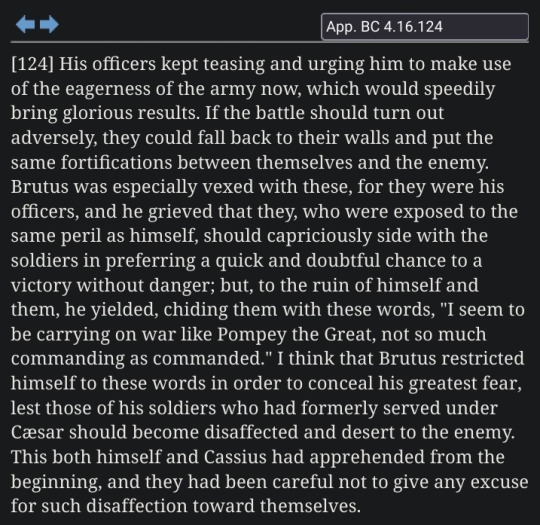
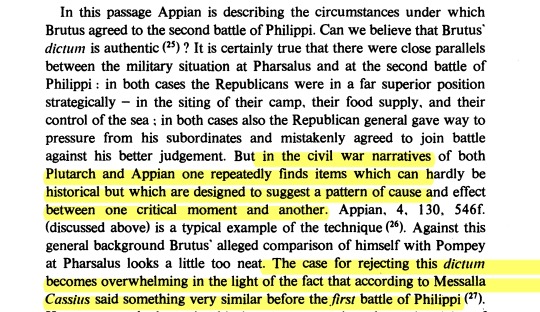
(1) Appian, Civil Wars 4.124.
(2) John Moles, Some "last words" of M. Junius Brutus.
What I am reading is that the second battle of Philippi is haunted by the first battle of Philippi, as Brutus is haunted by Cassius in the twenty days in between (which are like a phantasma, or a hideous dream), to the point of Cassius speaking through his mouth.
2 notes
·
View notes
Text
Events 10.23 (before 1940)
4004 BC – James Ussher's proposed creation date of the world according to the Bible.
42 BC – Liberators' civil war: Mark Antony and Octavian decisively defeat an army under Brutus in the second part of the Battle of Philippi, with Brutus committing suicide and ending the civil war.
425 – Valentinian III is elevated as Roman emperor at the age of six.
502 – The Synodus Palmaris, called by Gothic king Theoderic, absolves Pope Symmachus of all charges, thus ending the schism of Antipope Laurentius.
1086 – Spanish Reconquista: At the Battle of Sagrajas, the Almoravids defeats the Castilians, but are unable to take advantage of their victory.
1157 – The Battle of Grathe Heath ends the Danish Civil War.
1295 – The first treaty forming the Auld Alliance between Scotland and France against England is signed in Paris.
1641 – Irish Catholic gentry from Ulster attempt to seize control of Dublin Castle, the seat of English rule in Ireland, so as to force concessions.
1642 – The Battle of Edgehill is the first major battle of the English Civil War.
1666 – The most intense tornado on record in English history, an F4 storm on the Fujita scale or T8 on the TORRO scale, strikes the county of Lincolnshire, with winds of more than 213 miles per hour (343 km/h).
1707 – The First Parliament of the Kingdom of Great Britain convenes.
1798 – The forces of Ali Pasha of Janina defeat the French and capture the town of Preveza in the Battle of Nicopolis.
1812 – General Claude François de Malet begins a conspiracy to overthrow Napoleon, claiming that the Emperor died in the Russian campaign.
1850 – The first National Women's Rights Convention begins in Worcester, Massachusetts.
1864 – American Civil War: The Battle of Westport is the last significant engagement west of the Mississippi River, ending in a Union victory.
1906 – Alberto Santos-Dumont flies an airplane in the first heavier-than-air flight in Europe.
1911 – The Italo-Turkish War sees the first use of an airplane in combat when an Italian pilot makes a reconnaissance flight.
1912 – First Balkan War: The Battle of Kumanovo between the Serbian and Ottoman armies begins.
1927 – The Imatra Cinema was destroyed in a fire in Tampere, Finland, during showing the 1924 film Wages of Virtue; 21 people died in the fire and almost 30 were injured.
0 notes
Text
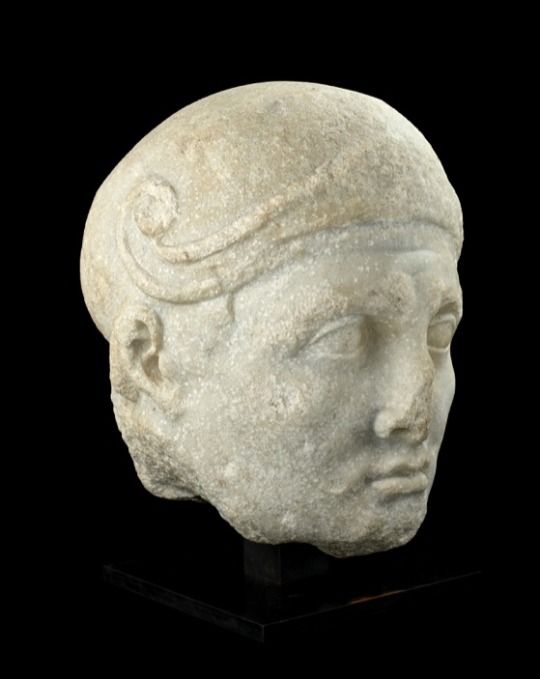

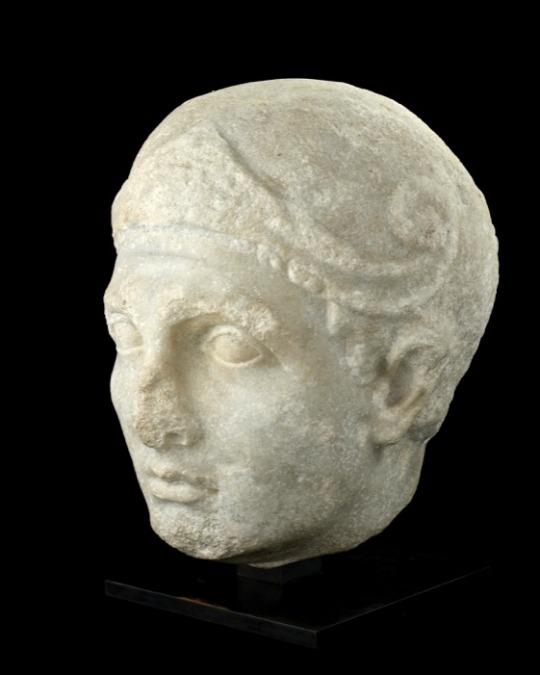
A ROMAN MARBLE PORTRAIT HEAD OF MARK ANTONY
CIRCA 1ST CENTURY B.C.
Marcus Antonius (14 January 83 BC – 1 August 30 BC), commonly known in English as Mark Antony, was a Roman politician and general who played a critical role in the transformation of the Roman Republic from a constitutional republic into the autocratic Roman Empire.
Antony was a relative and supporter of Julius Caesar, and he served as one of his generals during the conquest of Gaul and the Caesar's civil war. Antony was appointed administrator of Italy while Caesar eliminated political opponents in Greece, North Africa, and Spain. After Caesar's assassination in 44 BC, Antony joined forces with Lepidus, another of Caesar's generals, and Octavian, Caesar's great-nephew and adopted son, forming a three-man dictatorship known to historians as the Second Triumvirate. The Triumvirs defeated Caesar's killers, the Liberatores, at the Battle of Philippi in 42 BC, and divided the government of the Republic between themselves. Antony was assigned Rome's eastern provinces, including the client kingdom of Egypt, then ruled by Cleopatra VII Philopator, and was given the command in Rome's war against Parthia.
Relations among the triumvirs were strained as the various members sought greater political power. Civil war between Antony and Octavian was averted in 40 BC, when Antony married Octavian's sister, Octavia. Despite this marriage, Antony carried on a love affair with Cleopatra, who bore him three children, further straining Antony's relations with Octavian. Lepidus was expelled from the association in 36 BC, and in 33 BC, disagreements between Antony and Octavian caused a split between the remaining Triumvirs. Their ongoing hostility erupted into civil war in 31 BC when Octavian induced the republic to declare war on Cleopatra and proclaim Antony a traitor. Later that year, Antony was defeated by Octavian's forces at the Battle of Actium. Antony and Cleopatra fled to Egypt where, having again been defeated at the Battle of Alexandria, they committed suicide.
With Antony dead, Octavian became the undisputed master of the Roman world. In 27 BC, Octavian was granted the title of Augustus, marking the final stage in the transformation of the Roman Republic into an empire, with himself as the first Roman emperor.
#A ROMAN MARBLE PORTRAIT HEAD OF MARK ANTONY#CIRCA 1ST CENTURY B.C.#mark antony#cleopatra#marble#marble head#marble statue#marble sculpture#ancient artifacts#archeology#archeolgst#history#history news#ancient history#ancient culture#ancient civilizations#ancient rome#roman history#roman empire#roman art
51 notes
·
View notes
Text
The Antonian Reading List
Mark Antony: A Life by Patricia Southern (Highly recommended!)
Mark Antony: A Biography by Eleanor Goltz Huzar (Highly recommended!)
The Life and Times of Marc Antony by Arthur Weigall (Recommended)
Marc Antony: His Life and Times by Allan Roberts (Recommended)
Marc Antony by Mary Kittredge
Antony & Cleopatra by Patricia Southern
Antony & Cleopatra by Adrian Goldsworthy (By far the most negative book on Antony by a modern historian, the Cleopatra portion is better)
Mark Antony: A Plain Blunt Man by Paolo de Ruggiero (Recommended)
Mark Antony and Popular Culture: Masculinity and the Construction of an Icon by Rachael Kelly
Mark Antony's Heroes: How the Third Gallica Legion Saved an Apostle and Created an Emperor by Stephen Dando-Collins
A Noble Ruin: Mark Antony, Civil War and the Collapse of the Roman Republic by W. Jeffrey Tatum (Highly recommend!)
Mark Antony & Cleopatra: Cleopatra's Proxy War to Conquer Rome & Restore the Empire of the Greeks by Martin Armstrong
Actium and Augustus: The Politics and Emotions of Civil War by Robert Alan Gurval
The Roman Revolution by Ronald Syme (Recommended)
Octavian, Antony and Cleopatra by W. W. Tarn
Fulvia: Playing for Power at the End of the Roman Republic by Celia E. Schultz
Cleopatra: Last Queen of Egypt by Joyce Tyldesley (Highly Recommended!)
Cleopatra by Michael Grant (Highly Recommanded!)
Cleopatra: A Life by Stacy Schiff (Highly Recommended!)
Cleopatra - A Biography by D. Roller
Cleopatra and Antony by Diana Preston
Cleopatra by Alberto Angela (Recommended)
Cleopatra by Jacob Abbott
Cleopatra the Great by Joann Fletcher
Cleopatra and Egypt by Sally-Ann Ashton
Cleopatra and Rome by Diana E. E. Kleiner
Cleopatra Her History Her Myth by Francine Prose
Cleopatra Histories, Dreams, and Distortions by Lucy Hughes Hallett (Recommended)
Cleopatra’s Daughter Egyptian Princess by Jane Draycott
The Storm Before the Storm by Mike Duncan
SPQR: A History of Ancient Rome by Mary Beard (Good for beginners)
The Last Assassin: The Hunt for the Killers of Julius Caesar by Peter Stothard
Robicon by Tom Holland
Alesia 52 BC: The final struggle for Gaul (Campaign) by Nic Fields
Actium 31 BC: Downfall of Antony and Cleopatra (Campaign) by Si Sheppard
Pharsalus 48 BC: Caesar and Pompey – Clash of the Titans (Campaign) by Si Sheppard
Philippi 42 BC: The death of the Roman Republic (Campaign) by Si Sheppard
Mutina 43 BC: Mark Antony's struggle for survival (Campaign) by Nic Fields
The War That Made the Roman Empire: Antony, Cleopatra, and Octavian at Actium by Barry Strauss
The Battle of Actium 31 BC: War for the World by Lee Fratantuono
Rome and Parthia: Empires at War: Ventidius, Antony and the Second Romano-Parthian War, 40–20 BC by Gareth C Sampson
Rivalling Rome: Parthian Coins and Culture by Vesta Curtis
Classical sources:
Plutarch’s Lives
Cicero: Philippics, Ad Brutum, Ad Familiares
Appian, The Civil Wars
Dio Cassius, The Roman History
Suetonius, The Twelve Caesars
Flavius Josephus, The Jewish War
Livy, The Early History of Rome
Tacitus, Annals and Histories
Friction:
The Tragedy of Julius Caesar by William Shakespeare
The Tragedy of Antony and Cleopatra by Willian Shakespeare
All For Love or The World Well Lost by John Dryden
The Siren and the Roman – A Tragedy by Lucyl
Caesar and Cleopatra by George Berbard Shaw
Cleopatra (play) by Sardou
Antony by Allan Massie
I, Claudius by Robert Graves
I, Cleopatra by William Bostock
Cleopatra by H. Rider Haggard
Cleopatra by Georg Ebers
Kleopatra (Vol I & II) by Karen Essex
Last Days with Cleopatra by Jack Lindsay
The Memoirs of Cleopatra by Margaret George
When We Were Gods by Colin Falconer
The Masters of Rome series by Colleen McCullough
Caesar's Soldier: Mark Antony Book I by Alex Gough (Ongoing series)
The Antonius Trilogy by Brook Allen
The Last Pharaoh series by Jay Penner
Throne of Isis by Juith Tarr
Hand of Isis by Jo Graham
Woman of Egypt by Kevin Methews
The Ides of Blood 01-06 (Comics)
Terror - Antonius En Cleopatra (Erotic yet pure love, Dutch comics)
Cleopatra - Geschiedenisstrip (Dutch comics)
Les Grands Personnages de l Histoire en Bandes Dessinees – Marc Antonie (French comics)
Les Grands Personnages de l Histoire en Bandes Dessinees – Cleopatre (French comics)
Les Grands Personnages de l Histoire en Bandes Dessinees – Julius Caesar (French comics)
Cléopâtre (French Manga)
Ils Ont Fait L'histoire - Cléopâtre (French Graphic Novel)
#mark antony#marc antony#marcus antonius#cleopatra#cleopatra vii#antony and cleopatra#rome#ancient rome#roman history#roman republic#roman empire#books#book recommendations#reading list#to read list#history
51 notes
·
View notes
Note
forgive my ignorance but did cassius actually get to kill the dog?? please tell me he did
I mean, I did cite in the last comic (where I called Dolabella a dog) that Cassius did very much get to avenge Trebonius, like Dolabella 100% did not survive it
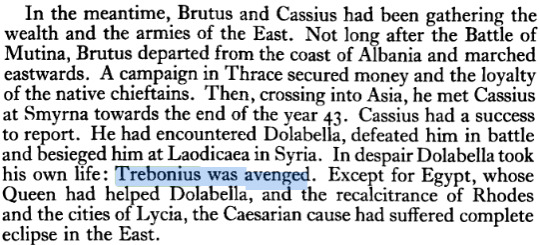
Philippi and Perusia, Ronald Syme
but here are some accounts to go with it!
When Cassius had again made such preparations as he could with the forces in hand he engaged Dolabella a second time. The first battle was doubtful, but in the next one Dolabella was beaten on the sea. Then Cassius completed his mound and battered Dolabella's walls till they trembled. He tried unsuccessfully to bribe Marsus, the captain of the night-watch, but he bribed the centurions of the day force, and while Marsus was taking his rest, effected an entrance by daylight through a number of small gates that were secretly opened to him one after another. When the city was taken Dolabella offered his head to his private sentry and told him to cut it off and carry it to Cassius in order to secure his own safety. The guard cut if off, but he killed himself also and Marsus took his own life. Cassius swore Dolabella's army into his own service. He plundered the temples and the treasury of Laodicea, punished the chief citizens, and exacted very heavy contributions from the rest, so that the city was reduced to the extremest misery.
Appian, BCiv, 4:62
Gaius Cassius, who had been sent by the Senate to pursue Dolabella (who was declared an enemy of the state), used the authority of the republic to obtain the three armies that were stationed in the province of Syria, laid siege to the town of Laodicea and forced Dolabella to commit suicide.
Liv. Per. 121
and also the cursed horse incident:
At that same time Cornelius Dolabella, the consul, on his way to Syria, attracted by the renown of this horse, turned aside to Argos, was fired with a desire to own the animal, and bought it for a hundred thousand sesterces; but Dolabella in his turn was besieged in Syria during the civil war, and slain. And soon afterwards Gaius Cassius, who had besieged Dolabella, carried off this same horse, which had been Dolabella's. It is notorious too that this Cassius, after his party had been vanquished and his army routed, met a wretched end. Then later, after the death of Cassius, Antonius, who had defeated him, sought for this famous horse of Cassius, and after getting possession of it was himself afterwards defeated and deserted in his turn, and died an ignominious death.
Gell. 3.9
#no actual dogs are killed I was just calling dolabella a dog (specifically Antony’s dog) if it was not clear.#ask tag
10 notes
·
View notes
Text
Working on the Octavian/Agrippa essay, and I'm really trying not to get distracted by all the battles, but I made a timeline of Agrippa's early military career and--
45 BCE: Possible service with Julius Caesar in Spain.
43: War of Mutina, minor role.
42: Battle of Philippi, minor role.
41: Perusine War (officer). Successfully diverts and isolates Lucius Antonius’ troops, and convinces 12,000 of them to change sides without a fight.
40: Retakes Sipontum from Antony’s forces in the Perusine War and repulses Sextus Pompeius’ forces from Thurii.
39-38: Defeats an uprising in Transalpine Gaul; takes on a second campaign to deal with German raids; becomes second Roman general to cross the Rhine.
37: Politely declines a triumph to avoid embarrassing Octavian, who'd just gotten his ass kicked by Sextus. Foils Sextus' attacks by turning the entrance to the Roman underworld into a secret naval base.
36: Defeats Sextus, the "Son of Neptune" and most skilled Roman admiral alive up till that point, twice, ending the Sicilian War and solidifying Octavian's control over Sicily.
At this point Agrippa was only 27 years old.
I...kind of feel bad for Antony having to fight this guy five years later.
#dammit agrippa leave something for the rest of us to excel at#fucker rolled a nat 18 on all his stats#marcus agrippa#True Facts About Marcus Agrippa#jlrrt speaks#jlrrt essays
81 notes
·
View notes
Text
Today In History:

A bit of October 23rd history…
42 BC - Roman Republican Civil Wars: Second Battle of Philippi - Brutus’ army is decisively defeated by Mark Antony and Octavian; Brutus commits suicide
1915 - An estimated 25,000 supporters in a women’s suffrage march on NY’s 5th Ave, led by Dr Anna Shaw and Carrie Chapman Catt, founder of the League of Women Voter
1941 - “Dumbo” released
1958 - The Smurfs 1st appear in the story “Johan and Pirlouit” by Belgium cartoonist Peyo
1977 - Discovery of a 3.4 billion year old one celled fossil, one of the earliest life forms on earth
1986 - Artist Keith Haring commissioned to paint a mural on the Berlin Wall by Checkpoint Charlie Museum - 300 meters long (pictured)
2015 - Adele releases “Hello”; becomes the 1st song with more than a million downloads in its 1st week
2018 - Microplastics found in human stools for 1st time
2019 - Google research lab claims it has achieved Quantum Supremacy performing calculation in 3 minutes that would take a supercomputer 10,000 years
0 notes
Text
also some of the dates for when the republic started to become an empire are: 146 bc (end of third punic war), 122 bc (gaius gracchus second tribunate), 104 bc (marius starts to be consul for a lot of years in succession), 82 bc (sulla as dictator), 49 bc (caesar dictatorship), march 15 44 bc (caesar assassinated), october 3rd 42 bc (first battle of philippi), september 2nd 31 bc (actium + rise of augustus), 14 ad (tiberius as emperor)
#i’m partial to philippi as the end of the republic as An Apparatus#but i think that by literal definition of when they started to go imperial could be as early as sulla??? idk. i’m passionate about it though#samael speaks
0 notes